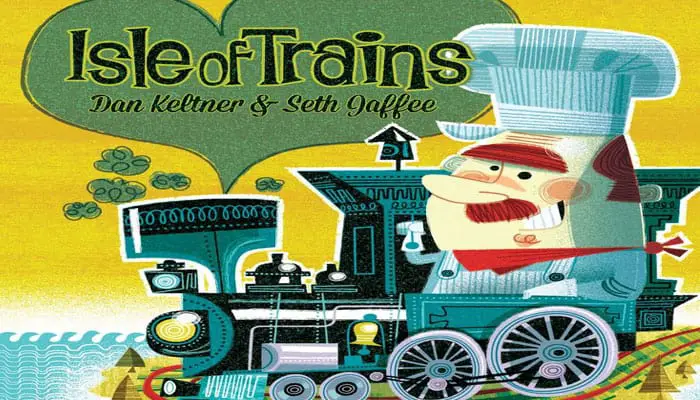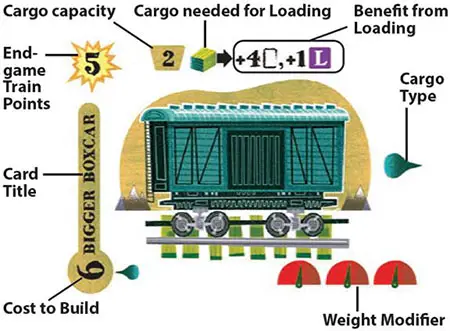

Components
- Full Color Rules Sheet
- Full Color Reference Sheet
- 50 Train Cards
- 6 Contract Cards
- Instructions
Object of the Game
Players are train operators working to build the best train and deliver cargo to various destinations.
Cards are used in multiple ways: they can be built as train cars or buildings supporting your train line, used as currency to pay the cost of building new train cars and buildings, or used as cargo to load on available train cars.
When loading cargo on an opponent's train, players receive an immediate benefit or action. Whoever gains the most points from building their train line and completing delivery contracts will be the winner!
Train Card Anatomy

Setup
- Each player starts with a Level 1 Engine (played face-up on the table) and 5 randomly dealt cards in hand.
- The 6 Contract Delivery Cards are placed in the middle of the table, primary side up, forming the Isle of Trains.
- Place the remaining cards into a draw pile in the middle of the table (including any unused Level 1 Engines).
- The player who most recently rode a train is first player.

Game Play
Starting with the first player and moving clockwise, each player takes 2 Actions on their turn from the following:
Take the top card from the draw pile.
Build 1 card from your hand into your playing area by paying its cost in cards to the discard pile.
Load 1 card from your hand onto any player's train car that has available capacity for the type of cargo shown on the right side of that card.
Deliver cargo cards from your train to the discard pile to claim contract cards and draw new cards.
Players can use their 2 actions to perform the same action twice or two different actions.
Players cannot choose an action that can't be performed. (for example, you can't choose to Deliver if you have no cargo loaded to be delivered).
After completing their actions, players discard cards until they reach their hand size limit (default is 5 cards). Play then rotates to the next player sitting clockwise.

Build
One (non-engine) train car can be discarded from the train before Building a new car.
Check first if the Engine Power ( ) would be enough to pull all train cars after the new car has been built. A train car can't be built if the Engine Power is less than the combined weight (
) would be enough to pull all train cars after the new car has been built. A train car can't be built if the Engine Power is less than the combined weight ( ) of the train cars. For instance, an Engine with Power of +4
) of the train cars. For instance, an Engine with Power of +4  can pull cars with a combined total weight
can pull cars with a combined total weight  .
.
Train cars can be upgraded (replaced) by a train car of the same type (for example, upgrade a Tanker card to a Super- tanker, or a Level 1 Engine to a Level 2 Engine).
When upgrading a train car, pay the difference between the Cost to Build values of the two cards, and discard the one being replaced.
A Build action can also be used to remove any number of train cars from that player's train (excluding the Engine). Any cargo loaded on those cars should be discarded as well.
Trains may have more than one Caboose. Each train may only have one Engine. Players may only have one Building in their playing area. Buildings cannot be upgraded. They may be replaced by discarding the old building, then paying the full cost of the new building.
Load
When Loading, a card from the player's hand is placed behind the train car that accepts the matching Cargo Type (for example, a card with a  Cargo Type must be used when Loading a Hopper car). Note that some cards are wild (
Cargo Type must be used when Loading a Hopper car). Note that some cards are wild ( ) and can be Loaded as any type of cargo.
) and can be Loaded as any type of cargo.
Cargo can't be Loaded if it will exceed the car's available cargo capacity ( ).
).
If Loading on another player's train car, the Loading player receives the benefit shown (for example,  allows the Loading player to draw 2 cards, then perform an additional Build).
allows the Loading player to draw 2 cards, then perform an additional Build).
After loading the cargo, first draw any cards, then take the additional action. If the additional action is not taken immediately, it is lost.
Cards Loaded through bonus +1  and +1
and +1  actions must be placed on the player's own train.
actions must be placed on the player's own train.
When Loading a card onto one of their own train cars, players do not receive the benefit shown on that car. When Loading, a player may discard one card to Load another card (placed face down) as ANY type of cargo.
Deliver
When Delivering, any number of goods from a player's train can be Delivered. Goods can be Delivered to complete a contract, or can be turned in to draw 2 cards for each Delivered good.
The player MAY claim one primary contract with some cargo, and draw cards with other cargo in the same Deliver action.
When claiming a primary contract, players must be able to fulfill the whole contract with the cargo currently loaded on their train. Discard the cargo cards and claim the contract card by placing it in the player's area.
There are 2 secondary contracts available on the back side of each contract card. Only 1 of these 2 can be completed. When that secondary contract is complete, slide the card under your Engine with the completed contract side facing up.
A player cannot claim another contract until one of the second- ary contracts on their current primary contract is completed.
Running out of Cards
Any time the draw pile is emptied, shuffle the discard pile and then use it to create a new draw deck.
When a player needs to draw cards and the entire deck (both draw and discard piles) is exhausted, they can draw "phantom cards" that can be used that turn only to pay for a Build action or as the discarded card when loading a good as any type.
If the entire deck is exhausted at the end of a player's turn, that player has triggered the game end.
End of the Game
he end of the game is triggered when there are no more cards available to draw at the end of a player's turn, or when a certain number of Delivery Contract cards have been claimed:
| 2 players | 3 players | 4 players |
|---|---|---|
| 4 Contract cards | 5 Contract cards | 6 Contract Cards |
When game end is triggered, the current player finishes their turn, then all players including that player get one final turn.
Scoring
After all turns are completed, each player counts up their points. Points may be gained by:
Train cars: Each train car that has been built in your playing area has a point value.
Completed Deliveries: Add the points for all completed Delivery Contract cards in your area (both the front and back contract points are totaled on the back of the card).
Buildings: Buildings played into your playing area will grant you a variable number of points at the end of the game (for example, the Customs House awards 2 points per Box delivered on the front and back of all completed Delivery Contract cards).
Loaded Cargo: Each cargo still loaded on your train is worth 1 point.
All players total up their points at the end of the game, and the most points wins!
If players tie for the most points, then the player with the most points from their Train Cars wins.
Scoring Example:
Continue Reading


